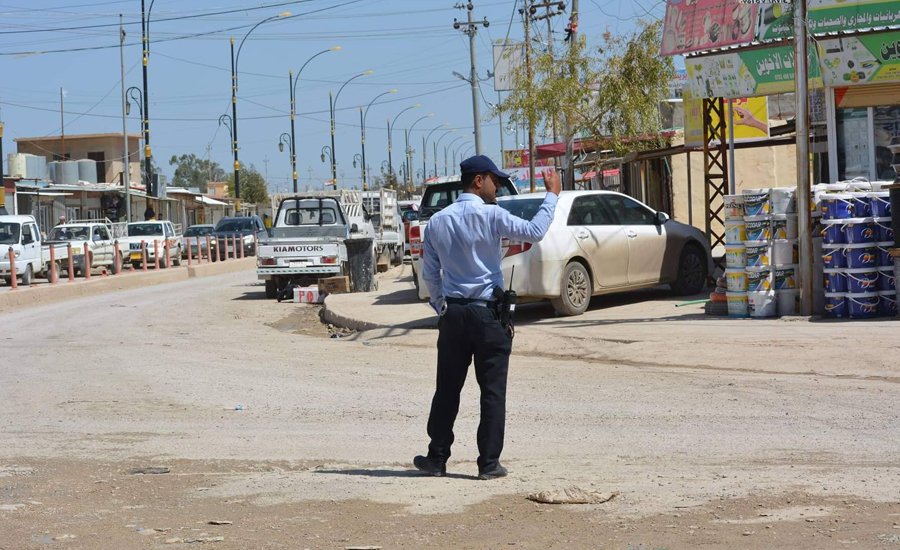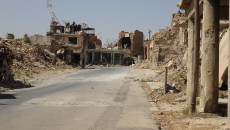The local administration of Shingal (Sinjar) has denied to replace its volunteer traffic police with policemen appointed by Baghdad as a step to implement part of Shingal pac signed by Baghdad and Erbil in October 2020.
Shingal Autonomous administrative Council, a local civil administration founded few years ago by locals supporting groups affiliated to Kurdistan Workers Party PKK, fighting Turkey and holding Iraqi territories, in 2017 has appointed 50 traffic policemen voluntarily in charge of traffic in Shingal.
The council which has not been recognized by Baghdad and Erbil is still administering the war-torn district, located 120 west of Mosul, center of Nineveh province, on the border of Iraq-Syria, and home to the Ezidi religious community, estimated at over half a million population, considered infidels by the extremist militants of Islamic State in Iraq and Levant ISIL.
Khudeda Ilyas, in charge of the local council in Shingal, said tow weeks ago, commander of Ninewa joint operations’ command called mayor of Sinuny and informed him about a trip to Shingal.
“He asked him to ask the traffic policemen to go home ahead of his trip because federal policemen will be appointed as part of Shingal pact,” Ilyas told KirkukNow.
Sinuny is a sub-district of Shingal and its administration is past of Shingal council.
In October 2020, the Iraqi federal government and the Kurdistan Regional Government KRG signed the Shingal Agreement aimed to reorganize the security and administrative dossiers in the district, under which local police, national security and intelligence run the security of the town in cooperation with KRG security forces, while the Iraqi army forces would be deployed in the suburbs.
The agreement which calls to appoint a new mayor for Shingal which has two mayors now, one of them affiliated to Kurdistan Democratic Party KDP and based in Duhok Northern Province was hailed by Baghdad, Erbil and Ankara as it leaves no excuse for any militia including the PKK to stay in town.
“We already said that we reject Shingal pact because people of Shingal were not involved and their views not taken into consideration,” Ilyas affirmed.
We already said that we reject Shingal pact because people of Shingal were not involved and their views not taken into consideration
Back in 2014, when ISIL took over Shnigal and about one third of Iraq, hundreds of thousands of Ezidis left their region to Mount Shingal and Iraqi Kurdistan Region IKR.
The Ezidi community blame Iraqi and Kurdish forces for turning their back to them when barbaric militants of IS stormed their region and committed atrocities mounted to genocide lately recognized by European parliaments.
They found the pro-PKK forces as the only way to protect their community and restore safety and stability. They accuse the Kurdistan Democratic Party KDP which was the senior Kurdish player in the region of collaboration with Turkey against pro-PKK groups.
In the Ezidi-dominant region of Shingal, only three thousand square kilometers, Baghdad federal and Erbil regional governments compete to establish their rule: three local administrations want to administer the district, and eight different armed forces are deployed.
The militant groups are Iran-backed Popular Mobilization Units PMU, YBSh and Ezidkhan Asayish which are pro-PKK, federal and local Police, Iraqi army and the Kurdistan Regional Government's KRG Peshmerga.
On November 9th, a group of Shingal traffic police in Sinuny protested the step by the Iraqi government.
“They want to replace us and send us home while we have been serving for free since 2017,” said Tahsin Mourad, in charge of Shingal traffic police. “We suggest to deplopy more traffic policemen and employ them as part of Ninewa Traffic police, funded and administered by the local administration of Ninewa and Iraqi ministry of interior.
“We reject the attempt of the Iraqi army to marginalize us instead of employing us officially by the federal government.
A thorough follow up by KirkukNow has found out that following the events of October 16th 2017, several vital projects in the health and education sector for the vulnerable community have been set aside.
The impoverished community whom still half back home and the rest prefer life under tents in the camps of Duhok province in the adjacent Kurdish region; lead a severe life amid absence of basic public services.
“Iraqi army commanders told me those traffic policemen in civic dress should go home which is unacceptable by us and it should be sorted out through mutual understanding,” Chuky added.






